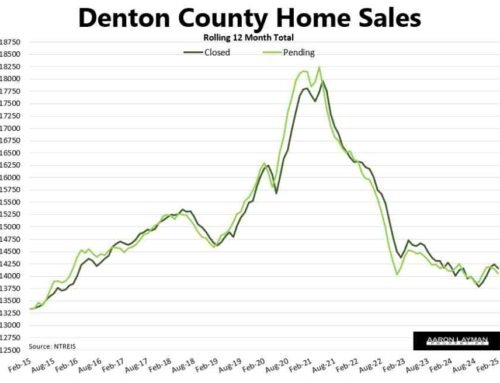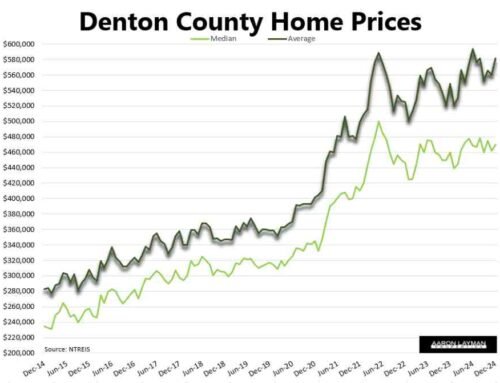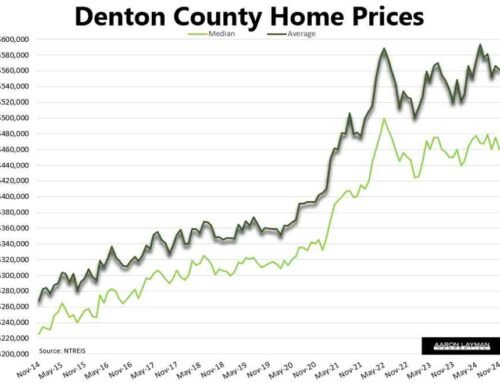Dallas Morning News’ real estate editor, Steve Brown, seems to be waking up to the fact that the DFW real estate market is cooling. He’s still off the mark when it comes to the recent peak in DFW home sales, but at least he acknowledged the sales decline last month. DFW home sales fell for the month of June. See, that wasn’t so hard.
After successive years of abnormal price growth, the DFW area saw a reported 3 percent decline in home sales in June. I say “reported”, because as I detailed in a previous post, Mr. Brown has been reporting some interesting things about DFW home sales that don’t exactly align with reality. Apparently they don’t train real estate editors on the dark art of statistical estimation.
If my full-time job were that of a real estate editor, I would probably invest some time scouring press releases before I reported them as fact. I would also make an effort to educate myself on real estate terminology so that I could provide readers with an accurate description of what’s happening in the real estate market. From my limited perspective, I don’t see that happening at the Dallas Morning News.
Maybe the Dallas Morning News real estate editor is too close to his sources to question them? I don’t know for sure. I can only make a guess. From my own personal experience I can say that I am always skeptical of anything coming from “expert” economists, and that includes those working at the Real Estate Center at Texas A&M and most certainly those at the Federal Reserve. I say this because I have seen the Federal Reserve’s groupstink passing as research in some of the work coming out of the RECenter.
A recent piece on affordable housing in Tierre Grande, and a recent symposium on affordable housing held at the Dallas Federal Reserve earlier this year serve as a reminder of the first rule of Fight Club. You are not supposed to talk about Fight Club! You won’t find the following charts offered by “expert” economists because the truth about Dallas home prices is taboo among the company of central bankers and traditional media. Maybe this is why Steve Brown can write so many articles on the Dallas housing market without mentioning the roots of Dallas’ recent home price inflation?
Allow me to offer some clarity. It took a while to kick in, but QE has done a bang-up job on Dallas home prices….
To be perfectly fair, the Fed also had some help. Bailing out the financial sector (Wall Street) wasn’t just a priority for the Fed. Other major central banks joined the liquidity party, in the process pushing large metropolitan housing markets across the globe into a synchronized speculative frenzy. This is why Dallas home prices are now largely detached from traditional economic fundamentals like wages.
It’s impossible to have any intelligent discussion on Dallas home prices (and particularly affordable housing in Dallas) without mentioning the Federal Reserve in that same discussion. The Federal Reserve facilitated the recent boom in real estate prices, and now they are in the process of taking away the punch bowl. Apparently Mr. Brown didn’t get the memo. If he had, he would have been writing about it last fall when the Fed began their balance sheet normalization. Rising interest rates are just one piece of the puzzle affecting Dallas home prices and sales volumes.
Perhaps instead of asking if the DFW housing market is signaling a new direction, Mr. Brown might want to get acquainted with the dynamics which facilitated the Dallas-Fort Worth housing boom in the first place. I don’t see that Mr. Brown or anyone at the Dallas Morning News has bothered to look at the real factors causing the Dallas area housing market to change course. They better get acquainted with them quickly, however, because QE works in both directions! That balance sheet unwind is slated to hit $50 billion per month in the fourth quarter of this year.
Those same market distortions that caused rampant home price inflation in the DFW area and across the globe, also caused thousands of DFW homes to remain trapped in renter nation as investors gobbled them up in the chase for yield. This is just one of the many distortions the Fed created in the new everything bubble. Guess what happens when you get a significant stock market correction and those speculative buyers and landlords decide to rush for the exits. Your “low inventory” mirage is exposed by a mean reversion in home prices and a new liquidation cycle.
For anybody who may be confused about home sales statistics and press releases, let me offer some Layman’s Terms to sort through the noise since the DMN seems to be confused about what’s happening.
“Preowned” – Otherwise known as resale. These are existing homes previously owned by another person or entity. Not to be confused with total sales or new construction sales.
Press Release – A document produced by an entity or organization focusing on what that entity WANTS you to know, not to be confused with news, particularly if distributed by a corporation.
QE – Quantitative Easing. The process whereby the Federal Reserve or another central bank floods the markets with liquidity thereby artificially boosting asset prices. See QE1, 2 & 3. See also rising wealth and income inequality.
Balance Sheet Normalization – This is the opposite of QE. The Federal Reserve lets maturing treasury bonds and mortgage-backed securities in its portfolio (the same securities acquired during QE) roll off the balance sheet, reducing the size of the Fed’s massive hedge fund which has been providing lift to both stock prices and real estate prices. See “pulling away the punch bowl”.
If you are looking for the Dallas Morning News real estate desk, the Real Estate Center at A&M, or the Dallas Federal Reserve’s economic “experts” to be completely transparent about what’s happening with the Dallas real estate market, don’t hold your breath. As Upton Sinclair said, “It’s difficult to get a man to understand something, when his salary depends upon his not understanding it.”
If you want to see Exhibit A of that rule in action, I will just leave you with one of the more infamous statements of former Fed Chair Ben Bernanke prior to a global economic meltdown…
“Housing markets are cooling a bit. Our expectation is that the decline in activity or the slowing in activity will be moderate, that house prices will probably continue to rise.” Ben Bernanke – February 2006














Leave A Comment